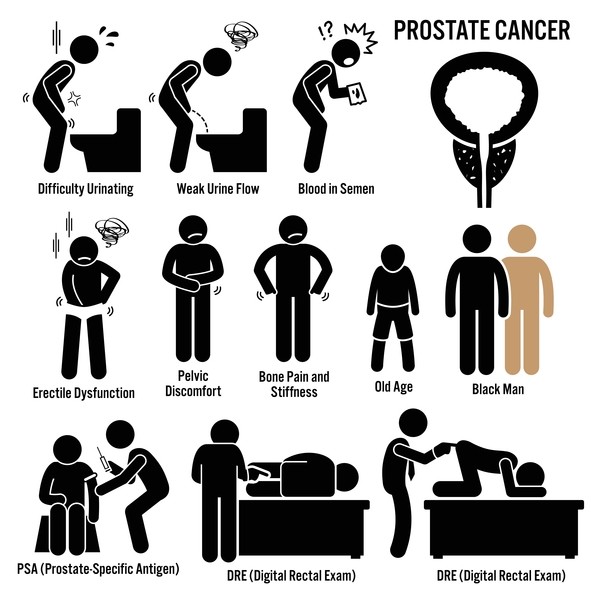Home » Prostate Cancer
Prostate Cancer

About Prostate Cancer
Prostate cancer is the most common type of cancer in men.
The cancer begins with a small nut-shaped prostate responsible for producing and transmitting the seminal fluid.
Prostate cancer begins when some of the cells that make up the prostate begin to grow and multiply uncontrollably. This abnormal growth creates a tumor, which is cancer.
There are types of prostate cancer that grow slowly and even require little or no treatment, and there are aggressive types that can spread rapidly to other organs in the body and produce metastases. This condition is called “metastatic prostate cancer” or “stage 4 prostate cancer.”
The existing therapies used for stage 4 metastatic prostate cancer are not curative, and this is a source of the need for innovative and effective treatment strategies in order to fight the disease. The National Cancer Institute, NCI, highlights the fact that for a certain group of prostate cancer patients, the best treatment option is to join one of the many clinical trials existing worldwide aiming to increase their chances of therapeutic success: longevity and quality of life.
Types of Prostate Cancer
- Adenocarcinoma – This cancer develops from the gland cells (the cells that form the prostate fluid that is added to the sperm) and it is the most common cancer among prostate cancers
- Small cell carcinoma
- Neuroendocrine tumor
- Transitional cell carcinoma
- Sarcomas
Symptoms
In the early stages the disease is not noticeable.
In advanced stages, one or more of the following symptoms may occur:
- Urinary difficulty – Burning in urine, poor or noncontinuous urine flow, sudden urge to give urine which sometimes increases at night
- Blood in the sperm
- Discomfort in the pelvis, back or hips
- Fatigue and shortness of breath
- Accelerated heartbeat
- Bone pain
- Impotence
The disease is common in older black men.
Sometimes in older men there will be growth of the prostate that is not cancerous and is benign. This condition is called Benign Prostatic Hyperplasia (BPH) and although it is not malignant, surgery may be required.
Diagnosis
- PSA test – blood test to identify prostate antigen concentration in the blood.
- Touch test – Rectal examination, Digital Rectal Examination, DRE

Treatment Goals
Treatment goals are to slow down and control disease progression as long as possible and help reduce symptoms. In stage 4 metastatic prostate cancer, the goals are to extend life and improve quality of life.
Treatment will be determined by a number of factors, including size, location and stage of the disease, whether or not it is a recurrence of the patient, the patient’s overall condition, family history and other medical measures.
Standard Treatment Protocols
Active Surveillance
Follow-up is used in the case of older men who do not have symptoms or patients with other illnesses or the disease was discovered in the case of a screening test.
On active surveillance, patients are given certain exams and tests, including the rectum, PSA, transectal ultrasound, and transectal biopsy, to see if the cancer is growing.
These men will not receive treatment until symptoms appear. It will often be sufficient to treat the symptoms and improve the quality of life.
When the cancer begins to grow, treatment is given with the goal to fully cure the patient.
Surgery
The goal is to remove the tumor and the margin around it. The lesion will be examined by a microscope to identify and diagnose the cancer type.
Two main types of treatment may be offered to patients before and after surgery:
Treatment prior to surgery, known as ‘Neoadjuvant treatment’
- Usually this stage of treatment will involve chemotherapy and/or radiotherapy intended to reduce the tumor’s size and improve the success of surgery.
Post-surgery treatment, also known as ‘Adjuvant treatment’
- This treatment seeks to cure and prevent the appearance of metastases or recurrence of the tumor. Prostate cancer, when metastasized is categorized as stage 4, is considered inoperable.
Radical Prostatectomy
Complete removal of the prostate, surrounding tissue and sperm bladder. Sometimes after this surgery side effects can develop, such as impotence, urinary difficulty, penis shortening, hernia.
Radiotherapy
This involves use of radiation at higher levels of energy aiming to kill the remaining cancer cells in the post-operative area. Men treated with radiotherapy have an increased risk of developing bladder cancer or gastrointestinal cancer as well as suffer from impotence.
In some cases of prostate cancer, radiation therapy will be done through brachytherapy.
Chemotherapy
Chemotherapy is a medicated therapy which aims to shrink and erase cancerous cells and allow control over the disease.
Chemotherapy carries serious side effects, while its effectiveness is insufficient.
Chemotherapy’s impact has a range of side effects such as hair loss, loss of appetite, changes to bowel movements, fatigue, infection, hemorrhaging, incontinence, pain, and more.
Common chemotherapy treatments include
- Taxotere®, Docetaxel
- Jevtana® Cabazitaxel
Hormone Therapy
Treatments that increase or decrease hormones level while unbalance levels can cause cancer.
To slow down or stop prostate cancer growth, synthetic hormones or other drugs can be given to block the body’s natural hormones.
In prostate cancer, male sex hormones, testosterone, can cause prostate cancer.
There are several main treatment groups:
GnRH blockers (also called LHRH agonists)
Luteinizing hormone releasing hormone agonists, or LHRH analogs or GnRH (Gonadotropin-releasing hormone) agonists is a common group of anti hormonal drugs that suppresses the pituitary gland and stops the production of male hormones. These drugs are given as an injection or as a subcutaneous implant.
Examples
- Decapeptyl®, Trelstar®, Triptorelin
- Zoladex®, goserelin
- Lucrin®,Lupron®, Eligard®, Leuprolide
- Vantas®, Histrelin
LHRH Antagonist
The mechanism of action is similar to GnRH blockers but the process is faster and does not encourage cancerous growth. Treatment of this drug can also be considered a type of medical castration.
Anti Androgens
Blocks male sex hormone activity by linking to receptors located on the tumor area and prevents testosterone linkage. The drugs are given in tablets.
- Xtandi®, Enzalutamide
- Erleada®, Apalutamide
- Eulexin®, Flutamide
- Casodex®, Bicalutamide
- Nilandron®, nilutamide
- Nubeqa®, darolutamide
Pregnenolone Analogues
Possible Immunotherapy drugs
- Keytruda®, Pembrolizumab
- Opdivo®, Nivolumab
- Imfinzi®, Durvalumab
- Tecentriq®, Atezolizumab
- Bavencio®, Avelumab

Clinical Trials for Prostate Cancer
Facts
- The existing therapies used on stage 4 metastatic prostate cancer are not curative, and this is a source to the need for innovative and effective treatment strategies in order to fight the disease.
- The National Cancer Institute, NCI, highlights the fact that for a certain group of prostate cancer patients, the best treatment option is to join one of the many clinical trials existing worldwide aiming to increase their chances of therapeutic success.
- Currently, every patient will be offered the standard protocols described above and sometimes the oncologist may suggest participation in clinical trials open and recruiting at his/her institute.
The Opportunity
- Advances in cancer therapies may be found in clinical trials prescribing cutting edge, innovative investigational drugs, some of which have already been recognized by the US Food & Drug Administration, the FDA, as “breakthrough drugs” and require further information to be approved.
- An entire world of clinical trials, Compassionate drugs and advanced new cancer treatments are available worldwide.
- It is important to know and have access to cutting edge cancer treatments that best match the unique medical condition of the patient and increase chances in winning the fight against the disease compared to the standard care offered.
Note to remember!
Not every patient is eligible to enter a specific clinical trial. The eligibility conditions must be fully met and each case is reviewed separately to ensure that the clinical trial matches the specific cancer patient and vice versa.
References
- https://www.fda.gov
- https://www.ema.europa.eu
- https://www.health.gov.il/Pages/HomePage.aspx
- https://www.cancer.gov/types/stomach
- https://www.cancer.org
- https://www.cancer.org
Dear Reader
This information is provided as a source of knowledge and does not constitute a medical consultation. For professional medical advice, see your attending physician. Information regarding drugs and commercial names belongs to the pharmaceutical companies
To check if our service suits your case
We need to talk

Improve therapeutic outcomes, prolong life and quality of life, are our main business.
We support access to and expand cancer treatments beyond the standard of care, with the most advanced and innovative treatment options in the world, personally matching the individual cancer patient’s medical condition and with the support of top tier oncologists.
Article categories
קטגוריות המאמרים
Popular topics







